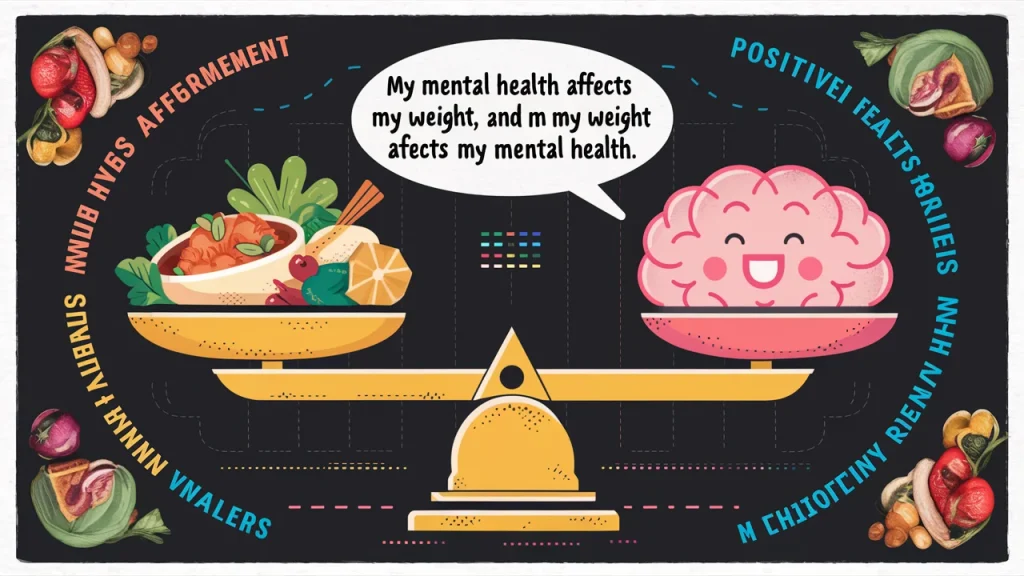Maintaining a healthy weight is not just about the numbers on the scale; it’s deeply intertwined with your mental well-being. In this article, we’ll explore the intricate relationship between weight management and mental health, guiding you towards a comprehensive, holistic approach to achieving overall wellness.
Your weight struggles don’t exist in a vacuum; they can have a profound psychological impact, affecting your self-esteem, body image, and emotional state. Conversely, your mental health can significantly influence your ability to manage your weight effectively. By understanding this dynamic, you’ll gain valuable insights into the importance of addressing both the physical and mental aspects of your health journey.
Throughout this article, you’ll learn strategies to develop a mindful, non-dieting mindset that fosters a healthier relationship with food and your body. We’ll delve into the role of physical activity, self-compassion, and stress management in achieving a balanced, sustainable lifestyle. Additionally, we’ll discuss the significance of building a supportive environment and seeking professional help when needed.
By the end of this journey, you’ll have a deeper understanding of the weight-mind connection and be equipped with practical tools to embark on a fulfilling path towards improved physical and mental well-being. Let’s uncover the keys to unlocking a healthier, happier you.
Key Takeaways
- Weight management and mental health are deeply interconnected, requiring a holistic approach for overall well-being.
- Developing a mindful, non-dieting mindset is essential for fostering a healthier relationship with food and your body.
- Regular physical activity, self-compassion, and effective stress management are vital components of a comprehensive weight management strategy.
- Building a supportive environment and seeking professional help can greatly aid in your journey towards improved physical and mental health.
- Understanding the weight-mind connection empowers you to make sustainable lifestyle changes for long-term success.
The Connection Between Weight and Mental Health
The intricate relationship between weight and mental health is a crucial aspect of holistic well-being. Understanding this connection is essential for individuals seeking to achieve a balanced, healthy lifestyle. The psychological impact of weight struggles, as well as the influence of mental health on weight management, play a significant role in the overall journey towards improved physical and emotional well-being.
The Psychological Impact of Weight Struggles
Struggling with weight can have a profound impact on an individual’s self-esteem, body image, and emotional well-being. The psychological impact of weight can manifest in various ways, such as feelings of low self-worth, body dissatisfaction, and even depression. These psychological challenges can further exacerbate weight-related issues, creating a vicious cycle that requires a comprehensive approach to address.
How Mental Health Influences Weight Management
Conversely, mental health conditions can also significantly influence an individual’s ability to effectively manage their weight. Conditions such as depression, anxiety, and stress can interfere with an individual’s motivation, energy levels, and decision-making processes, making it more difficult to maintain healthy eating habits and engage in regular physical activity. Understanding this weight-mental health connection is crucial for developing a holistic approach to weight management and overall well-being.
By recognizing the intertwined nature of weight and mental health, individuals can gain valuable insights and adopt a more comprehensive strategy for achieving their health and wellness goals. This understanding lays the foundation for a journey that addresses both the physical and psychological aspects of weight management, empowering individuals to cultivate a balanced, sustainable, and fulfilling lifestyle.
Developing a Mindful Eating Approach
Cultivating a mindful eating approach is the foundation for effective weight management and overall well-being. At the heart of this approach is the development of heightened awareness of your body’s hunger and fullness cues. By learning to tune in to these subtle signals, you can better understand and respond to your body’s needs, fostering a healthier relationship with food.
Cultivating Awareness of Hunger and Fullness Cues
One of the key principles of mindful eating is developing the ability to recognize when you are truly hungry and when you have reached a state of fullness. This involves slowing down during mealtimes, paying attention to physical sensations, and tuning in to your emotional state. By practicing this awareness, you can avoid the pitfalls of emotional eating and make more conscious choices about nourishing your body.
Embracing a Non-Dieting Mindset
Alongside cultivating hunger and fullness cues, it is essential to embrace a non-dieting mindset. This approach emphasizes self-acceptance, balanced nutrition, and sustainable lifestyle changes over restrictive dieting. By focusing on intuitive eating and self-care, you can break free from the cycle of yo-yo dieting and develop a more positive, empowered relationship with your body and your health.
Through the implementation of these strategies, you can create a solid foundation for long-term weight management success. By fostering a mindful eating approach, you’ll be better equipped to navigate the challenges of weight management while prioritizing your overall physical and mental well-being.
Integrating Physical Activity for Overall Well-being
Embarking on a weight management journey requires a holistic approach that encompasses both physical and mental health. Regular physical activity plays a crucial role in this endeavor, offering a multitude of benefits that extend beyond just weight regulation. By integrating physical activity into your lifestyle, you can experience a profound impact on your overall well-being.
The benefits of regular exercise go far beyond the physical. Engaging in physical activity can positively influence your mental health, reducing symptoms of depression and anxiety, and improving your mood and overall sense of well-being. Additionally, physical activity can help manage stress levels, which is particularly important in the context of weight management, as stress can often lead to emotional eating and other unhealthy coping mechanisms.
The Role of Self-Compassion in Weight Management
As you embark on your weight management journey, it is essential to cultivate self-compassion. Self-compassion involves treating yourself with kindness, understanding, and acceptance, even during moments of struggle or setbacks. By practicing self-compassion, you can learn to approach your weight management goals with a nurturing and non-judgmental mindset, which can significantly enhance your chances of long-term success.
Research has shown that individuals who approach their weight management efforts with self-compassion tend to experience greater overall well-being, improved self-esteem, and a more positive body image. Self-compassion also helps to reduce the negative impact of weight-related stigma and shame, which can be significant barriers to effective and sustainable weight management.
By integrating physical activity and fostering self-compassion, you can create a holistic framework that supports your weight management goals while also enhancing your overall mental and emotional well-being. This balanced approach empowers you to embark on a fulfilling journey towards a healthier and more confident you.
Addressing Emotional Eating and Stress Management
One of the most significant, yet often overlooked, aspects of weight management is the role of emotional eating and stress. When individuals turn to food as a coping mechanism for difficult emotions or overwhelming stress, it can create a vicious cycle that undermines their weight management efforts. This section will guide you in identifying your emotional triggers and developing healthy strategies to address stress, ultimately empowering you to maintain a balanced, mindful relationship with food.
Identifying and Managing Emotional Triggers
The first step towards overcoming emotional eating is to become more aware of the situations, emotions, or events that drive you to seek comfort in food. Take time to reflect on the patterns you observe, whether it’s stress from work, feelings of loneliness, or the need to self-soothe after a challenging day. By identifying these emotional triggers, you can begin to develop alternative coping mechanisms that address the root cause, rather than turning to food as a temporary fix.
Healthy Coping Strategies for Stress Relief
Implementing effective stress management techniques is crucial for breaking the cycle of emotional eating. Explore a variety of healthy coping strategies, such as mindfulness practices, physical activity, or engaging in enjoyable hobbies. Mindfulness exercises, like deep breathing or meditation, can help you become more attuned to your body’s signals and respond to emotional triggers with clarity and self-compassion. Additionally, regular physical activity can serve as a positive outlet for stress, releasing endorphins and improving your overall well-being. By cultivating a diverse toolbox of healthy coping strategies, you’ll be better equipped to navigate challenging emotions without relying on food as a default solution.
By addressing the emotional and psychological aspects of weight management, you’ll gain a comprehensive understanding of the holistic approach necessary for achieving lasting success. With the skills to identify your emotional triggers and adopt healthy coping mechanisms, you’ll be empowered to maintain a balanced, mindful relationship with food, ultimately supporting your overall health and well-being.
FAQ
What is the connection between weight management and mental health?
The relationship between weight management and mental health is a complex and intertwined one. Weight struggles can have a significant psychological impact, affecting self-esteem, body image, and emotional well-being. Conversely, mental health conditions, such as depression and anxiety, can greatly influence an individual’s ability to manage their weight effectively.
How can I develop a mindful eating approach?
Cultivating a mindful eating approach involves developing awareness of your hunger and fullness cues, and embracing a non-dieting mindset that emphasizes self-acceptance, balanced nutrition, and sustainable lifestyle changes over restrictive dieting. By fostering a healthier relationship with food, you can set the stage for long-term weight management success.
What is the role of physical activity in weight management and overall well-being?
Integrating physical activity is a key component of holistic weight management and mental health. Regular exercise can provide various physical, mental, and emotional benefits, and incorporating enjoyable physical activities into your lifestyle can contribute to your overall well-being. Additionally, cultivating self-compassion can be a powerful tool in your weight management journey.
How can I address emotional eating and manage stress?
Emotional eating and stress can significantly impact weight management. Identifying your emotional triggers and developing healthy coping strategies for stress relief are crucial. Techniques such as mindfulness practices, emotional regulation skills, and alternative stress-relieving activities can help you break the cycle of emotional eating and maintain a balanced, healthy relationship with food.











